Introduction
Can Rats Eat Almonds: All rodents love nuts, from peanuts/peanut butter and walnuts to almonds and hazelnuts. In fact, just about any nut can serve as ample nourishment for rats and mice. As such, these high-protein energy sources are always a favorite. Rats can eat almonds is a common one, as pet rat owners and those concerned about wild rat populations seek to understand the implications of offering these nuts as part of a rat’s diet.
Almonds are indeed a nutritious food for humans, packed with healthy fats, protein, fiber, and essential vitamins and minerals. However, when it comes to rats, there are important considerations to keep in mind. Rats have unique dietary requirements and digestive systems that differ from humans. Almonds, a popular nut among humans, are no exception.
The potential benefits and risks associated with feeding almonds to rats, considering factors such as the type of almonds, portion sizes, and the overall impact on a rat’s health. Understanding how almonds fit into a rat’s diet is essential for responsible pet rat ownership and for addressing concerns related to wild rat behavior and nutrition.
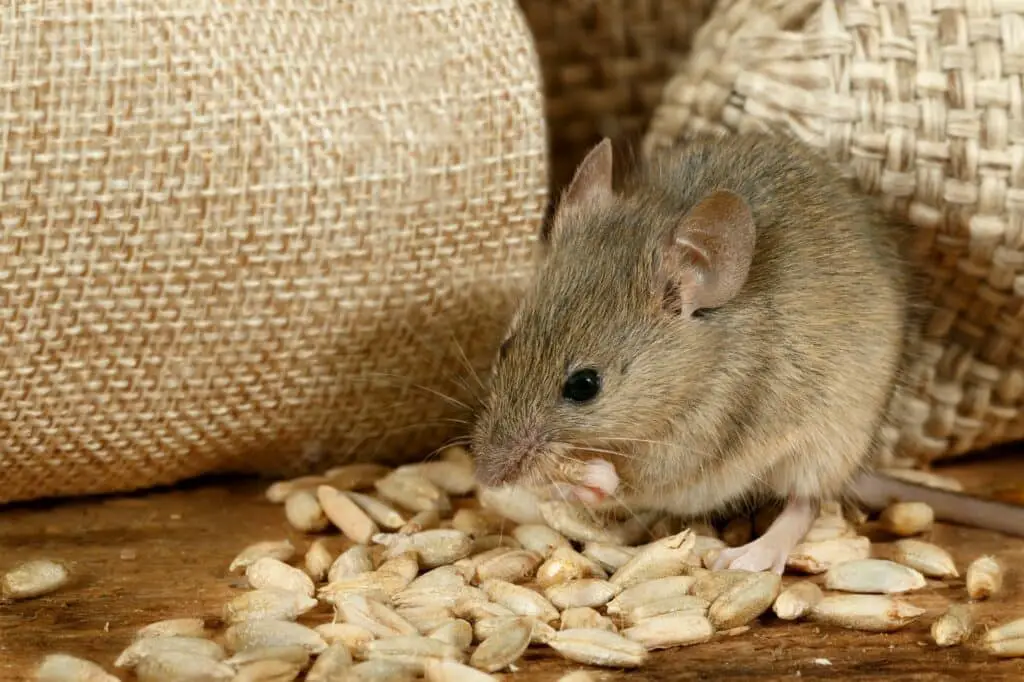
What is a rat eating food?
Rats are omnivores, meaning they are healthiest when they eat a combination of fruits, veggies, and meats. So, the best rat diet consists of mostly fresh fruits and vegetables, plus a small portion of rat pellets or rat cube food daily. A rat’s diet can vary depending on whether it’s a pet rat or a wild rat, but both types share some common dietary preferences and requirements.
Wild Rat Diet: Wild rats are opportunistic omnivores, which means they can consume a wide range of foods. Their diet primarily consists of grains, seeds, fruits, vegetables, and various plant materials. They are also known to eat insects, small animals, and carrion when available. In urban environments, they often scavenge for human food scraps, which can include anything from bread to discarded fast food.
Pet Rat Diet: Pet rats have more controlled diets. A balanced diet for pet rats typically includes high-quality commercial rat pellets as a base, supplemented with fresh fruits and vegetables. Rats also need a source of protein, such as lean meats or insects. Nuts and seeds can be given in moderation as treats, but they are high in fat and should not be a primary food source.
Water: Both wild and pet rats need access to fresh, clean water at all times to stay hydrated. To provide a balanced diet for pet rats to ensure their health and longevity. Offering a variety of foods helps meet their nutritional needs, while avoiding excessive treats, sugary foods, and fatty items is essential.
In contrast, addressing issues related to wild rats often involves minimizing access to food sources, maintaining proper sanitation, and employing humane pest control measures to prevent infestations in and around human habitats.
Can rats eat almond butter?
Rats can eat almond butter in moderation, but it’s important to exercise caution when offering this food to them. Almond butter is a concentrated source of fats and proteins, which can be beneficial in small amounts, but it should not make up a significant portion of a rat’s diet.
Moderation: Almond butter should be given as an occasional treat rather than a primary food source. A small amount, such as a tiny dab on a piece of bread or a fingertip, is sufficient.
Nutritional Benefits: Almond butter provides healthy fats, proteins, and some vitamins and minerals. These nutrients can be beneficial for rats, but they should be balanced with other foods in their diet.
High Fat Content: Almond butter is calorie-dense due to its high fat content. Rats are prone to obesity, so excessive consumption can lead to weight gain and health issues.
Natural Almond Butter: Opt for natural almond butter without added sugars, salt, or other additives. These extra ingredients are unnecessary and can be harmful to rats.
Allergies: Just like in humans, some rats may have allergies or sensitivities to nuts, including almonds. Monitor your rat for any adverse reactions after giving them almond butter.
Food Safety: Ensure that the almond butter is fresh and uncontaminated. Moldy or rancid foods can be harmful to rats.
A rat’s primary diet should consist of commercial rat pellets, fresh fruits, vegetables, and a source of lean protein. Almond butter should be considered an occasional treat to add variety to their diet, but it should not replace their essential foods. Whether it’s hazelnuts or peanuts, rats and mice rank nuts high in their list of food sources. So the walnuts and peanut butter you have lying around in the kitchen are ample nourishment for the rats and mice. Peanut butter and almond butter are irresistible, not only for you, but also for the rats and mice.
What foods are bad for rats?
Avoid harmful foods such as onion, citrus fruits, walnuts, rhubarb, grapes, raisins and chocolate. Avoid sugars and high-fat foods such as dairy. Rats like sweet and fatty food, but it can cause health problems if they eat too much of it, so only use these as treats and rewards during training.
Rats, whether pet or wild, have specific dietary needs, and there are several foods that are considered harmful or potentially toxic to them.
Junk Food: Foods high in sugar, salt, and artificial additives, such as candy, chips, and sugary cereals, should be strictly avoided. These items can lead to obesity, dental problems, and other health issues.
Citrus Fruits: Citrus fruits like oranges, lemons, and grapefruits are too acidic for rats and can upset their digestive systems. Avoid giving them citrus fruits.
Raw Beans: Raw beans contain lectins, which can be toxic to rats. Always cook beans thoroughly before offering them.
Green Potatoes and Tomatoes: These vegetables contain solanine, which can be harmful when consumed in large quantities. Cooking them can reduce the solanine content, making them safe in moderation.
Avocado: Avocado contains a substance called persin, which can be toxic to rats and many other animals. It’s best to avoid feeding them any part of the avocado.
Raw Sweet Potatoes: Raw sweet potatoes can be challenging for rats to digest and may cause digestive issues. Cooked sweet potatoes are safe in moderation.
Caffeine and Alcohol: Just like in many animals, caffeine and alcohol are toxic to rats and should never be given to them.
Onions and Garlic: These vegetables contain compounds that can be harmful to rats and may cause gastrointestinal problems or even more severe health issues.
When planning a rat’s diet, it’s essential to prioritize fresh fruits and vegetables, high-quality commercial rat pellets, and a source of lean protein. Always consult with a veterinarian or experienced rat owner for guidance on providing a balanced and nutritious diet for your pet rats.
What are rats’ Favorite food?
Probably a favorite food for all kinds of rodents. They are also the strongest magnets for both rats and mice, thanks to the incredible sense of smell these two species have. Decomposing fruit emits a much stronger sweet smell than seeds and nuts.
Rats are known for their opportunistic and adaptable feeding habits, and their favorite foods can vary depending on their individual tastes and environmental factors. However, certain foods tend to be universally appealing to rats.
Fresh Fruits: Rats have a sweet tooth, and they often relish fresh fruits like apples, bananas, berries, and grapes. These fruits are not only tasty but also provide essential vitamins and nutrients.
Vegetables: Rats generally enjoy a variety of vegetables, including leafy greens, carrots, cucumbers, and broccoli. These vegetables offer fiber and other essential nutrients for their diet.
Whole Grains: Whole grains like oats, brown rice, and whole wheat pasta are a hit with rats. These foods are excellent sources of carbohydrates and dietary fiber.
Lean Proteins: Rats need protein in their diet, and they often enjoy lean sources such as cooked chicken, turkey, or scrambled eggs.
Nuts and Seeds: While high in fat, small quantities of nuts like almonds and seeds like sunflower seeds can be tasty treats for rats.
Cheese: Many rats are fond of cheese, especially softer varieties like cottage cheese or cream cheese. However, cheese should be given sparingly due to its fat content.
Yogurt: Plain, unsweetened yogurt can be a delicious and probiotic-rich treat for rats.
While rats enjoy a variety of foods, their diet should be well-balanced and provide essential nutrients. Offering too many high-fat or sugary foods can lead to health issues like obesity. Always prioritize fresh, wholesome foods in their diet and consult with a veterinarian for dietary recommendations specific to your pet rats.
What food attracts rats more?
Rats tend to prefer foods that are high in nutrients, like fat and protein. Some of the most common foods used to bait rat traps are peanut butter, bacon, dried fruit, or meat (like hot dogs) that won’t make a mess of your trap but have enough protein and fat to attract them.
Rats are opportunistic feeders, and their food preferences can vary based on factors such as availability, environment, and individual taste. However, certain types of food tend to be more attractive to rats due to their nutritional value and palatability.
High-Calorie Foods: Rats are drawn to high-calorie foods because they provide a quick energy boost. Items like nuts, seeds, and fatty meats are enticing to rats due to their caloric density.
Sugary Foods: Rats have a preference for sweet foods. Sugary items like fruits, cereals, and candies can be highly attractive to them. However, excessive sugar consumption can lead to obesity and health problems.
Protein Sources: Rats need protein for growth and maintenance. They are often attracted to protein-rich foods such as meat, fish, and eggs. This natural preference for protein is essential for their overall health.
Starchy Foods: Starchy foods like grains, bread, and pasta can be appealing to rats. These foods provide carbohydrates for energy.
Fruits: Many rats enjoy the taste of various fruits, including apples, bananas, and berries. Fruits not only provide essential vitamins but also appeal to their sweet tooth.
Human Food Scraps: In urban environments, rats are often drawn to human food scraps left in trash cans or discarded in public areas. These can include leftovers from fast food, restaurants, and households.
Pet Food: Rats may be attracted to pet food left accessible, especially dry kibble or food with a strong scent.
While these foods can be attractive to rats, they should not be relied upon as a primary food source. Rats require a well-balanced diet that includes a combination of fresh fruits, vegetables, lean proteins, and a good quality commercial rat pellet. Feeding rats a varied and nutritionally balanced diet is essential for their health and well-being.
Can rats go without food?
Rats greatly depend on the rat’s organism. It’s very likely that most would survive for a week but no more than two weeks, without having anything to eat. Rats are like squirrels and like to store their food. So even if you cut their food source they would still have some reserve to last them for a while.
Rats, like most animals, cannot go without food indefinitely, but they are highly adaptable and can survive for a period without eating. Their ability to endure food scarcity depends on several factors, including their health, age, body condition, and access to water.
Duration: Rats can survive without food for varying lengths of time, typically ranging from a few days to about two weeks. This duration can be influenced by individual differences and environmental conditions.
Water: Access to water is essential for rats. They can survive longer without food if they have a source of clean, fresh water because they can stay hydrated. However, water alone is not sufficient for their overall nutrition.
Body Condition: Rats with a healthy body weight and sufficient fat reserves can withstand food deprivation for longer periods than undernourished or sick rats.
Age: Young rats may have less stored energy reserves and may be more vulnerable to food deprivation than adult rats.
Behavioral Adaptations: Rats are skilled scavengers and can adapt their foraging behavior to locate alternative food sources, which can help them survive during food shortages.
While rats can endure short periods without food, prolonged starvation can lead to severe health issues, including weakness, organ damage, and ultimately death. It’s essential to provide rats, especially pet rats, with a balanced and nutritious diet to ensure their well-being.
What do rats eat in a day?
Most appropriate food is laboratory pellets or lab blocks for the basic diet – specifically formulated to meet all of a rat’s nutritional needs; rat and mouse grain mix can be fed occasionally but isn’t necessarily a balanced diet; occasional fresh fruit and vegetables. Rats need approximately 60 calories per day.
A rat’s daily diet can vary depending on whether it’s a wild rat or a pet rat, but both types share certain dietary preferences and nutritional needs.
Commercial Rat Pellets: A significant portion of a pet rat’s diet consists of high-quality commercial rat pellets. These pellets are specially formulated to provide essential nutrients, vitamins, and minerals.
Fresh Fruits and Vegetables: Pet rats should be offered a variety of fresh fruits and vegetables daily. Examples include apples, bananas, carrots, peas, and leafy greens like kale or spinach.
Lean Protein: Rats need a source of protein in their diet. This can include cooked chicken, turkey, scrambled eggs, or occasional insects like mealworms.
Fresh Water: Access to clean, fresh water is essential for hydration. Rats should always have water available.
Rats should receive a well-balanced diet that includes a combination of commercial rat pellets, fresh fruits and vegetables, and lean protein sources. Providing a variety of foods helps meet their nutritional needs and keeps them healthy.
What makes rats hungry?
Rats, like most animals, become hungry primarily due to physiological and biological factors, as well as environmental cues.
Energy Depletion: When rats expend energy through activities like foraging, exploring, or even reproduction, their bodies require replenishment of calories. As their energy reserves decrease, hunger signals are activated.
Digestion: As rats digest the food they’ve consumed, their stomachs gradually empty. This process triggers hunger as the body senses a need for more sustenance to maintain energy levels.
Regulation of Blood Sugar: Rats, like humans, rely on stable blood sugar levels for energy. After consuming a meal, blood sugar levels rise. Over time, as blood sugar decreases, hunger sensations increase, prompting rats to seek out more food.
Circadian Rhythms: Rats, like many animals, have internal biological clocks that regulate their eating patterns. They tend to be more active and hungry during certain times of the day or night, depending on their species.
Environmental Cues: Rats are highly adaptable and can associate specific environmental cues, such as the smell of food or the presence of other rats eating, with the availability of food. These cues can stimulate their hunger.
Reproductive Needs: During reproduction, female rats may experience increased hunger to support the growth of fetuses or the production of milk to nurse their young.
Hunger in rats, as in other animals, is a complex interplay of physiological, biochemical, and environmental factors. It serves as a crucial motivator for them to seek out and consume the necessary nutrients to sustain their bodily functions and maintain their health.
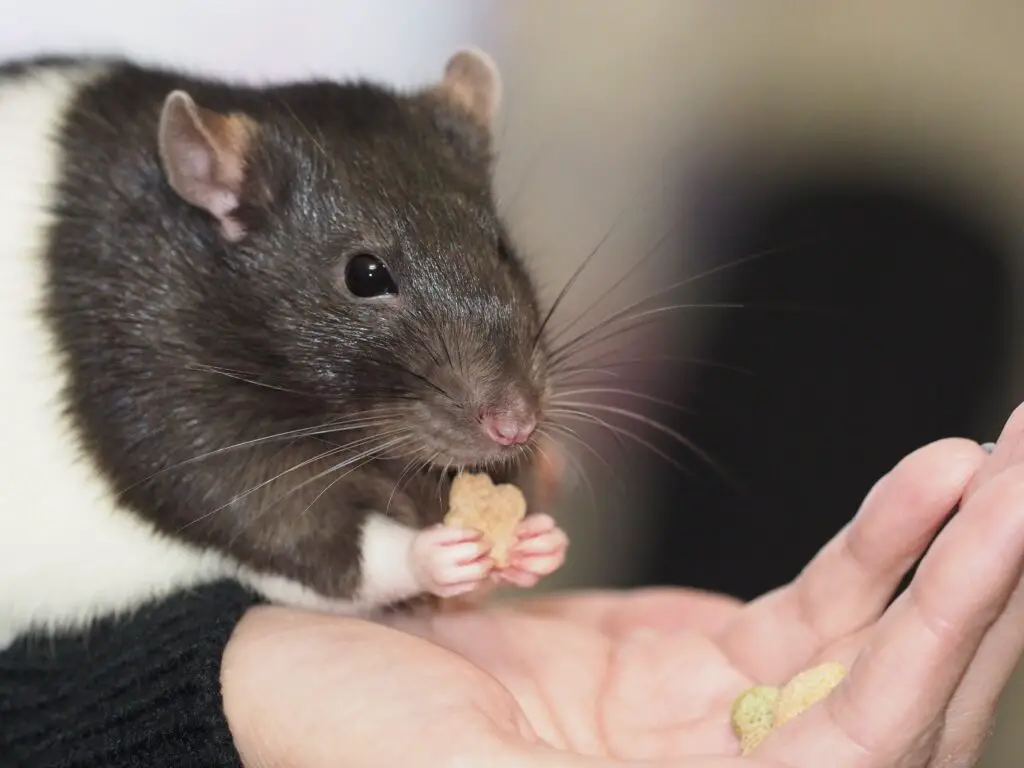
Conclusion
Rats can eat almonds, but it should be done in moderation and with careful consideration. Almonds provide a source of healthy fats, protein, fiber, and essential nutrients that can be beneficial for rats when included as a part of their balanced diet.
Portion Control due to their small size, rats should only be given a small portion of almonds, preferably as an occasional treat. Almonds are calorie-dense and high in fat, which can lead to obesity if consumed excessively. Almond Type opt plain, unsalted, and unseasoned almonds. Flavored or salted almonds can be harmful to rats due to the added ingredients.
Almonds should not replace the essential components of a rat’s diet, such as commercial rat pellets, fresh fruits, vegetables, and lean protein sources. Health Considerations are always to monitor rats for any adverse reactions after giving them almonds, as some rats may have allergies or sensitivities to nuts. While almonds can be a tasty and nutritious addition to a rat’s diet when offered thoughtfully, it’s essential to prioritize a diverse and balanced menu to ensure their overall health and well-being.

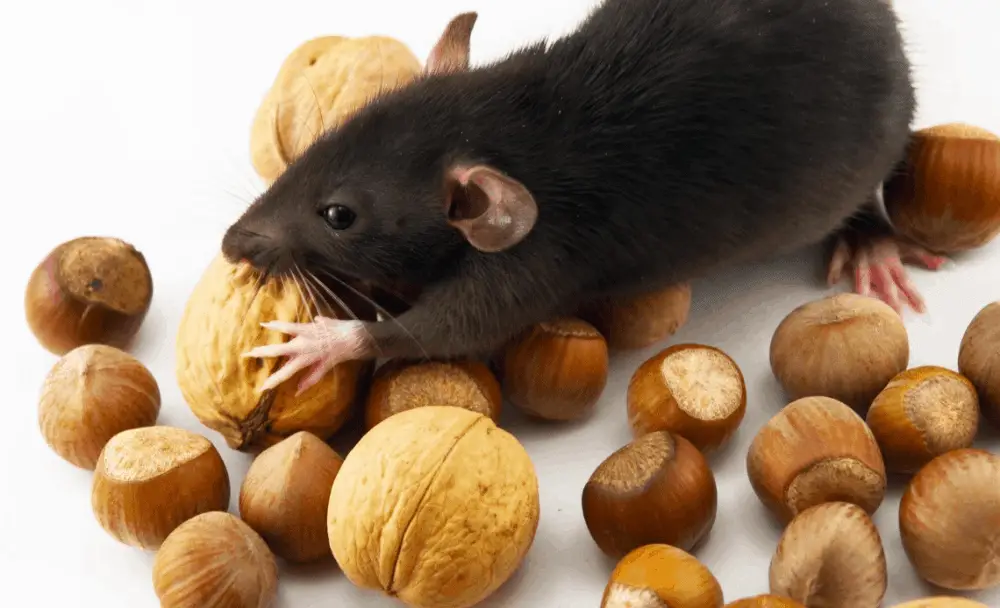
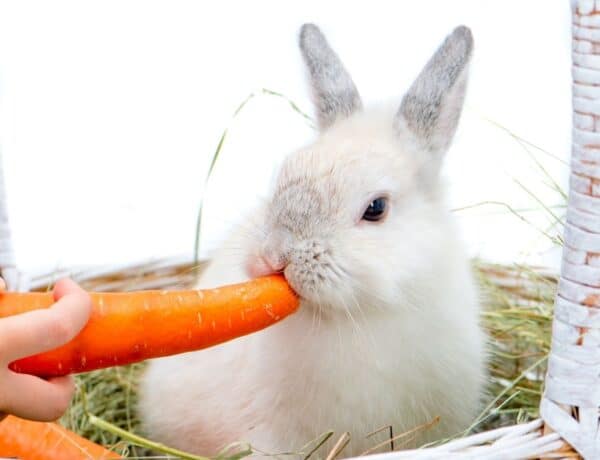

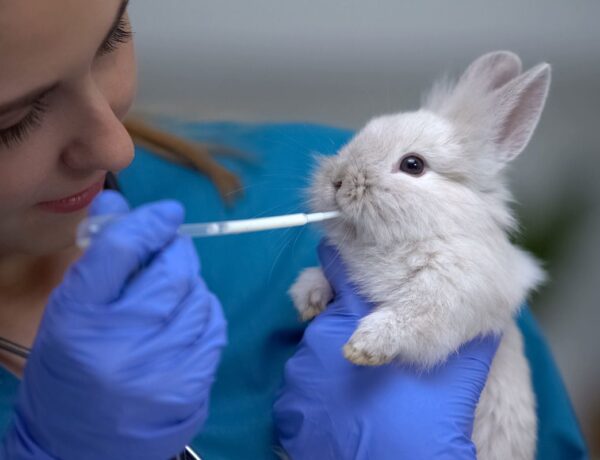
No Comments